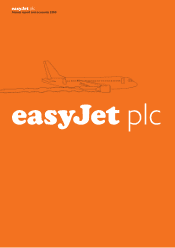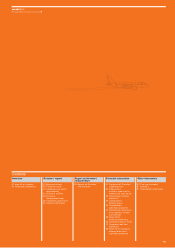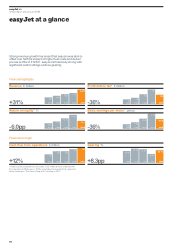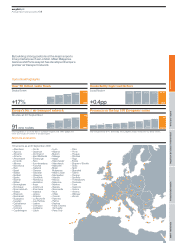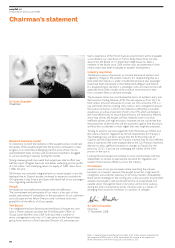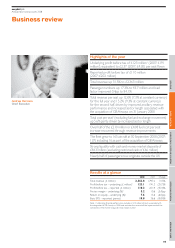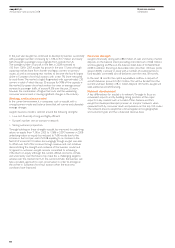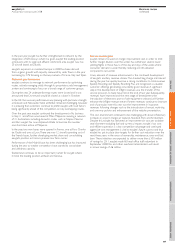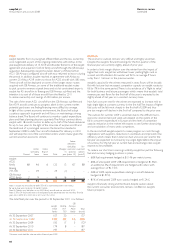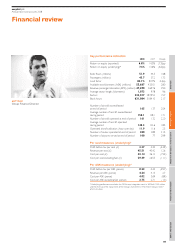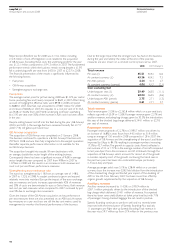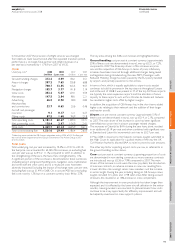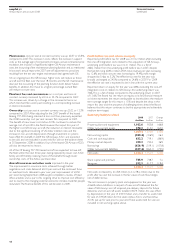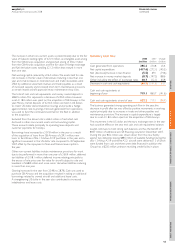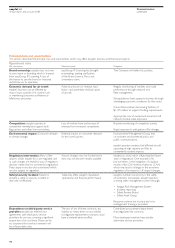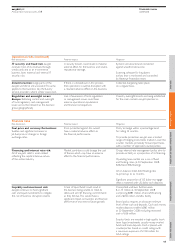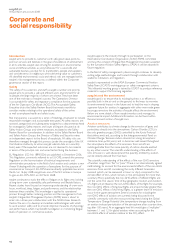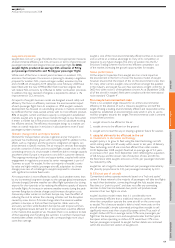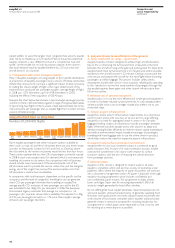EasyJet 2008 Annual Report Download - page 10
Download and view the complete annual report
Please find page 10 of the 2008 EasyJet annual report below. You can navigate through the pages in the report by either clicking on the pages listed below, or by using the keyword search tool below to find specific information within the annual report.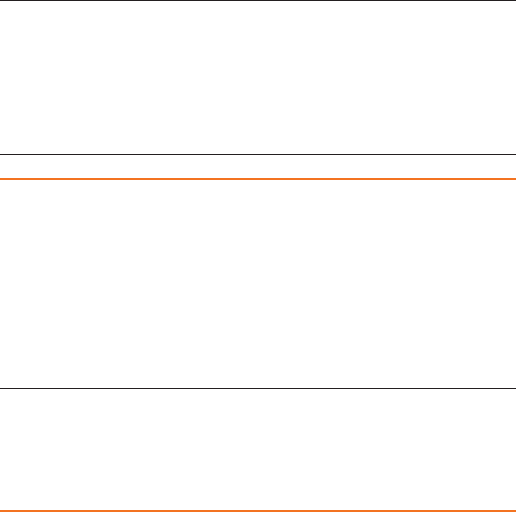
Outlook
The economic outlook remains very difficult and highly uncertain.
Despite this easyJet’s forward bookings for the first quarter of the
financial year are currently slightly ahead of prior year.
In order to limit margin dilution over the winter from the impact of
higher fuel costs easyJet has withdrawn lower yielding flights, and as
a result aircraft utilisation this winter will fall to an average 9 hours
a day from 11.6 hours in the previous winter.
easyJet’s capacity for the winter, measured in seats flown, will be broadly
flat with last year but we expect competitor capacity on easyJet routes to
fall by 7% in the same period. There is also evidence of a “flight to value”
for both business and leisure passengers which means that easyJet’s total
revenue per seat flown for the first half of the year is expected to be
slightly ahead of last year on a constant currency basis.
Non fuel costs per seat for the winter are expected to increase mid to
high single digits at constant currency in the first half. The impact of higher
fuel costs will be felt most sharply in the first half of 2009 and thus
pre tax margins will decline in the first half compared to the prior year.
The outlook for summer 2009 is uncertain due to the difficult macro-
economic environment and yields will depend on the extent of the
fall in consumer expenditure in Europe and the level of competitor
capacity reduction in the market. We expect to see further downsizing
and consolidation of many weak competitors.
In the second half, easyJet expects to make progress on costs through
negotiations with suppliers, reductions in overheads and improved crew
efficiency which means that in total non fuel unit costs per seat for the
full year are expected to increase by low single digits before the impact
of currency. For the full year at current fuel and exchange rates easyJet
expects to be profitable.
To reduce our short-term earnings volatility easyJet has put the following
fuel and currency hedging positions in place:
• 66% fuel requirement hedged at $1,146 per metric tonne;
• 66% of anticipated 2009 US$ requirement is hedged at $1.96/£,
an additional 5% of requirement are hedged with collars with
average floors of $1.73/£;
• 56% of 2009 capital expenditure relating to aircraft deliveries
hedged at $1.97/£;
• 81% of anticipated 2009 euro surplus hedged at €1.24/£.
easyJet is financially strong and the Board, despite caution about
the current consumer environment, remains confident in easyJet’s
future prospects.
Fleet
easyJet benefits from its young fuel efficient fleet and the low ownership
costs negotiated as part of the ongoing relationship with Airbus. In the
year, easyJet took delivery of 13 A319 aircraft under the terms of the easyJet
agreement and acquired 15 A320 family aircraft through the GB Airways
acquisition. Subsequently, easyJet has taken delivery of three further
A321 GB Airways configured aircraft with two returned to lessors during
the period. In addition, easyJet reached an agreement with Airbus to
convert 25 Airbus A319 orders to those for A320 aircraft with 180 seats.
These aircraft will be deployed on some of the longer sector routes
acquired with GB Airways, on some of the traditional easyJet routes
to pick up extra revenue at peak times and at slot constrained airports.
easyJet has 45 aircraft in its Boeing and GB Airways sub-fleet and the
intention is to exit all of these aircraft from the fleet by 2011
to realise ownership cost savings of £40 million per annum.
The sale of the seven A321 aircraft from the GB Airways sub-fleet and
five A319 aircraft continues to progress albeit in the current market
potential purchasers are finding financing more difficult to arrange.
In light of the current economic environment, the Board will adopt
a cautious approach to growth and will focus on maintaining a strong
balance sheet. The Board will continue to monitor capital expenditure
plans and fleet planning decisions quarterly. The Airbus contract allows
easyJet, with 18 months notice, to defer up to half of the future deliveries
for up to two years. In the light of the slow sale of surplus aircraft and
the likelihood of a prolonged recession the Board has decided in
September 2008 to defer four aircraft scheduled for delivery in 2010
and will keep the rest of the committed orders under review given the
current uncertain economic climate.
Future
deliveries
(including Un-
Under Under Changes exercised exercised
operating finance in options) options
Owned lease lease Total year (notes 1,3) (note 2)
easyJet
A320
family 68 46 6 120 13 107 88
Boeing
737-700 – 29 – 29 (1) – –
GB Airways
A320 family 7 9 – 16 16 2 –
75 84 6 165 28 109 88
Note 1: easyJet has the ability to defer 50% of its committed orders with Airbus
for up to two years by giving 18 months’ notice.
Note 2: Options may be taken as any A320 family aircraft and are valid until 2015.
Note 3: The 109 future deliveries are anticipated to be delivered over the next four financial
years, 36 in 2009, 30 in 2010, 24 in 2011 and 19 in 2012.
The total fleet plan over the period to 30 September 2011 is as follows:
GB
easyJet Boeing Airways
A320 737- A320 Total
family 700 family aircraft
At 30 September 2007 107 30 – 137
At 30 September 2008 120 29 16 165
At 30 September 2009 150 17 5 172*
At 30 September 2010 179 8 – 187
At 30 September 2011 197 – – 197
*Assumes assets held for sale are sold in financial year 2009.
easyJet plc
Annual report and accounts 2008
Business review
continued
08

